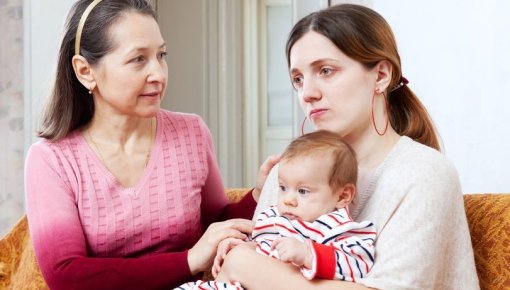Adina J, Morawska A, Mitchell AE et al. Effect of Parenting Interventions on Perinatal Depression and Implications for Infant Developmental Outcomes: A Systematic Review and Meta-Analysis. Clin Child Fam Psychol Rev 2022; 25(2): 316-338.
Branquinho M, Rodriguez-Muñoz MF, Maia BR et al. Effectiveness of psychological interventions in the treatment of perinatal depression: A systematic review of systematic reviews and meta-analyses. J Affect Disord 2021; 291: 294-306.
Brown JV, Wilson CA, Ayre K et al. Antidepressant treatment for postnatal depression. Cochrane Database Syst Rev 2021; (2): CD013560.
Dennis CL, Dowswell T. Psychosocial and psychological interventions for preventing postpartum depression. Cochrane Database Syst Rev 2013; (2): CD001134.
Dorsch VM, Rohde A. Postpartale psychische Störungen – Update 2016. Frauenheilkunde up2date 2016; 10 (4): 355-374.
Embryotox, Charité Universitätsmedizin Berlin. Arzneimittelsicherheit in Schwangerschaft und Stillzeit.
Fang Q, Lin L, Chen Q et al. Effect of peer support intervention on perinatal depression: A meta-analysis. Gen Hosp Psychiatry 2022; 74: 78-87.
Howard LM, Oram S, Galley H et al. Domestic violence and perinatal mental disorders: a systematic review and meta-analysis. PLoS Med 2013; 10(5): e1001452.
Huang R, Yang D, Lei B et al. The short- and long-term effectiveness of mother-infant psychotherapy on postpartum depression: A systematic review and meta-analysis. J Affect Disord 2020; 260: 670-679.
Kingston D, Tough S, Whitfield H. Prenatal and postpartum maternal psychological distress and infant development: a systematic review. Child Psychiatry Hum Dev 2012; 43(5): 683-714.
Knudson-Martin C, Silverstein R. Suffering in silence: a qualitative meta-data-analysis of postpartum depression. J Marital Fam Ther 2009; 35(2): 145-158.
Li X, Laplante DP, Paquin V et al. Effectiveness of cognitive behavioral therapy for perinatal maternal depression, anxiety and stress: A systematic review and meta-analysis of randomized controlled trials. Clin Psychol Rev 2022; 92: 102129.
Martín-Gómez C, Moreno-Peral P, Bellón JA et al. Effectiveness of psychological interventions in preventing postpartum depression in non-depressed women: a systematic review and meta-analysis of randomized controlled trials. Psychol Med 2022: 1-13.
Mocking RJ, Steijn K, Roos C et al. Omega-3 Fatty Acid Supplementation for Perinatal Depression: A Meta-Analysis. J Clin Psychiatry 2020; 81(5).
Morres ID, Tzouma NA, Hatzigeorgiadis A et al. Exercise for perinatal depressive symptoms: A systematic review and meta-analysis of randomized controlled trials in perinatal health services. J Affect Disord 2022; 298(Pt A): 26-42.
O'Connor E, Senger CA, Henninger M et al. Interventions to Prevent Perinatal Depression: A Systematic Evidence Review for the U.S. Preventive Services Task Force. 2019.
Pentland V, Spilsbury S, Biswas A et al. Does Walking Reduce Postpartum Depressive Symptoms? A Systematic Review and Meta-Analysis of Randomized Controlled Trials. J Womens Health (Larchmt) 2022; 31(4): 555-563.
Stewart DE, Vigod SN. Postpartum Depression: Pathophysiology, Treatment, and Emerging Therapeutics. Annu Rev Med 2019; 70: 183-196.
Suradom C, Suttajit S, Oon-Arom A et al. Omega-3 polyunsaturated fatty acid (n-3 PUFA) supplementation for prevention and treatment of perinatal depression: a systematic review and meta-analysis of randomized-controlled trials. Nord J Psychiatry 2021; 75(4): 239-246.
Wang G, Liang C, Sun G. Yoga's Therapeutic Effect on Perinatal Depression: A Systematic Review and Meta-Analysis. Psychiatr Danub 2022; 34(2): 195-204.
Wang TH, Pai LW, Tzeng YL et al. Effectiveness of nurses and midwives-led psychological interventions on reducing depression symptoms in the perinatal period: A systematic review and meta-analysis. Nurs Open 2021; 8(5): 2117-2130.
Yasuma N, Narita Z, Sasaki N et al. Antenatal psychological intervention for universal prevention of antenatal and postnatal depression: A systematic review and meta-analysis. J Affect Disord 2020; 273: 231-239.
Zhang MM, Zou Y, Li SM et al. The efficacy and safety of omega-3 fatty acids on depressive symptoms in perinatal women: a meta-analysis of randomized placebo-controlled trials. Transl Psychiatry 2020; 10(1): 193.
IQWiG health information is written with the aim of helping people understand the advantages and disadvantages of the main treatment options and health care services.
Because IQWiG is a German institute, some of the information provided here is specific to the German health care system. The suitability of any of the described options in an individual case can be determined by talking to a doctor. informedhealth.org can provide support for talks with doctors and other medical professionals, but cannot replace them. We do not offer individual consultations.
Our information is based on the results of good-quality studies. It is written by a team of health care professionals, scientists and editors, and reviewed by external experts. You can find a detailed description of how our health information is produced and updated in our methods.

